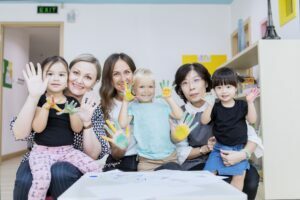Remember the last time that you made a mistake? Or had a bad day? Did you tell yourself that it was because “I’m terrible”? Or did you say to yourself “Oh, well. Tomorrow I will work on doing that better”?
When we talk to ourselves in a positive way, we can make a huge difference in how we feel. Positive self-talk can also help children to build self-esteem and confidence. And when children learn to give themselves positives, they may be more likely to keep trying even when things don’t work out the way they planned the first time or to try new things that they feel nervous about.
How can you help children to use positive self-talk? Here are some tips:
- Teach your child to recognize negative self-talk. Listen for when you hear your child say things about himself that are negative, things that begin with “I can’t”, “I never” or “I always”. Talk with him about how he feels when he hears himself say that he can’t or will never be able to do something. Point out how that can actually stop your child from doing his best because it takes away his confidence.
- Help your child turn things around. So if your child is afraid she will not be able to speak in front of her class, for example, ask her why she feels that way. Maybe she feels like she is not prepared enough. Reassure her that you believe that she can do it. And then help her practice some more. Ask her to think of some positive things about herself that she can say when she is nervous or upset, like “I practiced this. I will do my best.”
- Give your child positive phrases to say. Sometimes it helps to have a positive phrase to use when your child is feeling nervous or afraid or is doubting himself. For example, former college basketball player and motivational speaker, Devin Hughes, says that his father taught him the phrase “I am, I can, I will”. You and your child could come up with his own phrase or something that has special meaning for your family. Then help your child to remember that when he starts saying negative things to himself, he should stop, take a breath, and think of his special phrase.
- Model positive self-talk. Just like with modeling good self-esteem, it is important to let your child hear you talking positively to yourself. So try to avoid negative self-statements and using phrases like “I can’t”, “I never” and “I always”. Instead, model the things that you would like your child to say to herself, like “I know today was hard but I can try again tomorrow” or “I believe I can be my best”. Positive self-talk can help you as well.
So, in the New Year, both you and your child can practice helping yourselves to do your best, try new things, and build self-confidence. Give yourselves a pep talk!





